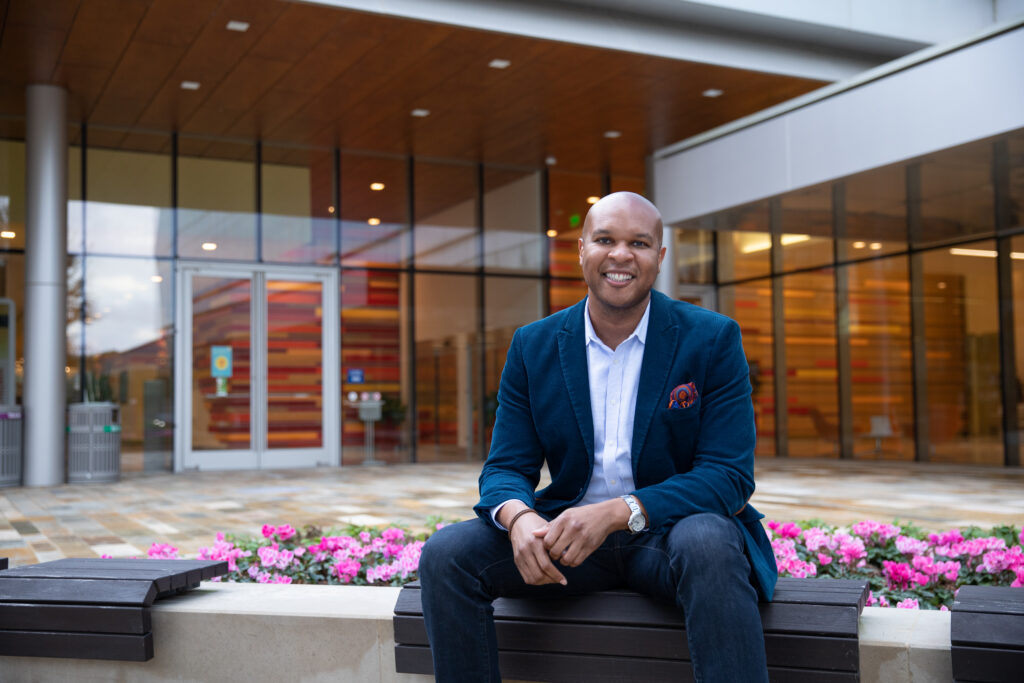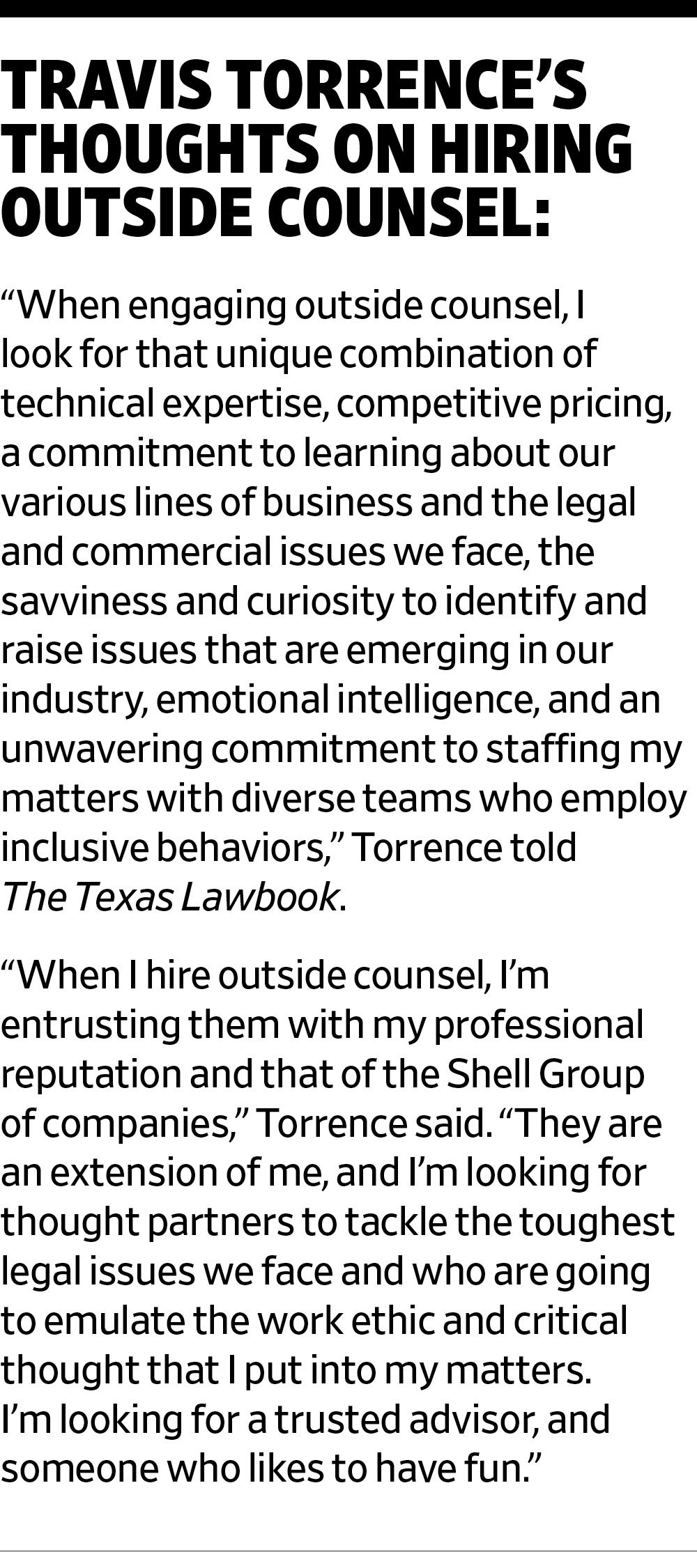Travis Torrence is the great-great-grandson of slaves who worked on plantations along the River Road in Louisiana — a swath of land between New Orleans and Baton Rouge — just footsteps away from a Shell USA refinery in Convent and just miles away from Shell’s petrochemical plant in Norco. He is the great-grandson of Mississippi sharecroppers. His dad was a truck driver and his mother was a public high school teacher.
Three months ago, London-based energy giant Shell named Torrence as its head of legal for its U.S. operations and associate general counsel over global litigation — the first Black person to hold the position.

“My story and my family’s history are not lost on me,” Torrence told The Texas Lawbook in an interview. “In just a few generations in my family, we’ve gone from slavery, to sharecropping, to Shell attorney.”
“I’m a young, Black, openly gay, Ivy League-educated attorney in the energy industry deep in the heart of Texas,” he said. “When I got that call to ask me if I would lead Shell Legal’s Global Racial Equity & Inclusion initiative in the wake of George Floyd’s murder [in 2020], it was a real opportunity to make a meaningful impact on the legal profession, the energy industry and the culture of an organization that has given so much to me.”
Torrence follows James Cowan, who retired from Shell earlier this year. He oversees a U.S. legal team of more than 150 lawyers, paralegals and staff. As head of legal, Torrence develops and enforces policies, reviews talent, builds culture and community and serves as the executive sponsor of the committees overseeing diversity, equity and inclusion and pro bono and community service.
The Association of Corporate Counsel’s Houston Chapter and The Lawbook honored Torrence in 2022 with its Houston Corporate Counsel Award for Achievement in Diversity and Inclusion.

Born and raised in Kenner, Louisiana, Torrence played basketball, football, baseball and track through middle school and switched to playing the tuba in band in high school. He was the first Black valedictorian at his high school. He majored in communications at Tulane University and worked as a disc jockey at a Top 40 rock format radio station.
When Torrence’s parents saw his college majors were communications and political science, his mother, a math teacher, said she had an important equation for him to memorize: “communication + political science = unemployed.”
Torrence told The Lawbook in 2022 that he loved being an on-air radio personality, but “the combination of my parents’ influence and learning more about the life of radio DJs convinced me that I needed to at least try law school on for size. I never intended to like the practice of law. But, after my first summer as a summer associate, I thought more seriously about the opportunities associated with working in Big Law.”
After graduating from Yale Law School in 2005, Torrence did a one-year clerkship with Judge Edward Prado of the U.S. Court of Appeals for the Fifth Circuit and then joined Fulbright & Jaworski, where he practiced in its bankruptcy and reorganization group for seven years.
In 2013, Shell hired Torrence as senior counsel for its bankruptcy creditors legal team. Witnessing his extraordinary legal successes and leadership skills, Shell kept promoting Torrence — to vice president of legal for its Jiffy Lube subsidiary in 2015 to global lead of bankruptcy litigation in 2018 to managing counsel of litigation in 2023.

Torrence said a huge day in his life was his first day working at Shell.
“When I told my family that I had gotten a clerkship with a judge who sat on the U.S. Court of Appeals for the Fifth Circuit, they thought nothing of it,” Torrence said. “When I told them I had obtained job offers from three white-shoe Houston law firms, they were unimpressed. But when I told them I was leaving private practice to join the legal department at Shell, their eyes lit up because Shell has been so good to my family.”
“And it all started with my Uncle Ricky,” he said.
Torrence’s Uncle Ricky barely had a high school diploma when he was hired at Shell.
“He was poor. He was Black. He was from a rural part of South Louisiana, but someone in Shell saw his drive. They saw his passion. And they gave him a shot,” he said.
Shell paid for Uncle Ricky’s education, and he went from entry level positions to retiring as the site supervisor at its facility in Norco, Louisiana.
“The people at that plant were his chosen family. He would do anything for them. And, they would do anything for him,” Torrence said. “He cared deeply about Shell’s business and the people with whom he worked, which is something I didn’t quite understand until I started working at Shell in 2013.”
Torrence said Uncle Ricky and Shell were hugely influential to his long-term decision making.
“The 1980s and 1990s were not kind to my parents from a financial perspective and I was a kid who wanted to participate in tons of activities that my parents couldn’t afford,” he said. “It was my Uncle Ricky and his Shell salary that subsidized my parents’ income and made it possible for me to participate in activities that kept me off the streets of New Orleans … activities that kept me out of trouble at an age when kids can easily make life-altering decisions … activities that set me on the path to being the man and lawyer I am today.”
In a recent interview on a podcast hosted by the executive recruiting firm Major, Lindsey and Africa, Torrence discussed his fear about people learning that he is gay.
“I never imagined a time when I would be able to tell my family members that I am gay,” he said. “I thought the second that I came out, I would lose my friends and that my family would disown me. I was afraid that my work at the law firm would dry up. I hated myself for years because of my sexual orientation.”
Torrence recalled the day that he told his dad that he is gay. He was walking through the tunnels in downtown Houston and called his dad and told him.
“The phone went silent for a very long time,” he said. “I thought we had been disconnected. Perhaps my dad had hung up on me and I would never talk with him again.”
Torrence said he looked at his phone. The connection was still there but there was silence. He saw the clock on the phone. Fifty-six seconds. Fifty-seven seconds. Silence.
And then his father, in tears, spoke.
“Travis, I’ve always loved you since the day that you were born and I am not going to stop loving you. You are always going to be my son.”
